- Equity, inclusion and sanitation workers
- Sanitation workers
- Health and safety aspects for sanitation workers
- Sanitation Work: Casestudies from Bangladesh
Sanitation Work: Casestudies from Bangladesh
3528 views
- shakilWASH
-
 Topic Author
Topic Author- CEO, PEACE(Research & Consultancy) WASH Focal , Tiller(Spatial Planning Consultancy) Specialist : #Climate Resilient Inclusive Smart City (CRISC) Planning and Development #Citywide Inclusive Sanitation Planning and Development
Less- Posts: 4
- Likes received: 2
Re: Sanitation Workers: A Frontier Fighter for Building a Healthy City [Case Study of Rangpur City, Bangladesh]
Sanitation employees have played a crucial role in any city's efforts to maintain a clean and healthy environment, but their contributions are frequently overlooked and undervalued. In the city of Rangpur, located in northern part in Bangladesh, sanitation workers encounter a variety of challenges and obstacles in carrying out their essential work. Many sanitation workers in Rangpur city are employed by the
local government like Rangpur City Corporation (RpCC) as muster roles, but they frequently work long hours for low wages, with little employment security or benefits. They are responsible for collecting and disposing of waste from residences, businesses, and public areas, typically under hazardous and unsanitary conditions. The lack of adequate equipment and protective gear is one of the main obstacles’ sanitation workers in the city of Rangpur confront. Numerous sanitation workers lack access to gloves, masks, and other protective clothing, putting them at risk for injury or illness due to exposure to hazardous materials. Due to a lack of awareness and access to safety gear (e.g., PPE), the vast majority of formal and informal sanitation workers in the RpCC do not use safety equipment and do not adhere to any occupational health and safety guidelines.
“I got twice OHS training and PPE in 2018 and 2020. I have learned operating vaccu tug and safe emptying from this training. I try to maintain safe emptying and don’t enter septic tank. We often work with empty hand and touched fecal sludge for the nature of my work. But I don't feel comfortable to use PPE during work. It's made disturbance in work. So, I use PPE rarely if get pressure from authority. Moreover, I think it's made me warmer and over sweating most of the time except winter. But I know, it's essential to use PPE for my safety. I will use PPE if these are manufactured with comfortable design and materials. It’s so dirty work and most of people behaved with us as untouched attitude. I feel shame for my job and I hide my profession from my family members and neighbors. We work at night due to avoid embarrassing situation and public teasing. On the other hand, our payment is too poor and
its monthly 8,000 taka ($80) only. How we can survive with our family and manage daily needs? There are no permanent job facilities, OHS gears and insurance. Actually, we are always unnoticed and our rights are always ignored by city authority and dwellers. We look forward to government and authorities for our basic rights and job securities.”
___Abdul Malek (Experiences of 6 years in the vacuum tanker emptying profession, RpCC)
Most manual and mechanical sanitation employees said in a focus group that they don't utilize personal protective equipment because it's either too expensive, too bulky, or too uncomfortable. I believe that the Rangpur City Corporation (RpCC) administration and other foreign aids and INGOs should regularly fund occupational health and safety training and personal protective equipment for sanitation workers. In addition, we need to encourage them to get regular counselling and have proper PPE on hand in case of inclement weather.
Furthermore, in Rangpur city, sanitation employees frequently encounter hostility and stigma from the general public. Their jobs are looked down upon as unskilled and unclean, and they are frequently harassed and verbally assaulted as a result. As a result, informing city people on the need of protecting the health and safety of sanitation workers is crucial.
"Now, I am 25 years old and I have started emptying containment at the age of 13 with my father and brother. I use rope and bucket. Often, I enter into the pit and septic tank if household demand and pay extra. I earn average 3,000-5,000 taka ($30-$50) per month by emptying containment outsourcing. I don’t get any training ever and also haven’t any safety gears. Actually, PPEs are not affordable
to us and nobody give it free yet. If I get it free, I will use it for my safety. I feel breathing difficulties and often abdominal pain with dysentery. If we are injured at work, we will not be compensated for our injuries, and no one will take responsibility. It's a generation-to-generation issue. We are in tremendous poverty as a result of a lack of work. We are losing jobs on a daily basis. What will happen to our
children and grandchildren? We maintain a healthy environment in the city, but what do we get? Unfortunately, we are subjected to incompetence, low salary, and no stable employment. Supports for occupational health and safety are just a dream for us. Can you say, what’s our sins? Though we are human like you, why people neglect us as social curse?”
___Mosal Basfor(Experiences of 12 years in the manual emptying profession, RpCC)
Sanitation workers' jobs do not receive any formal acknowledgement by local authorities with regard to permanent job facilities, it was discovered during focus group discussions with sanitation workers and KII with Conservancy officer. They are paid on a monthly basis in the amount of 8,000 taka ($80), as well as on a per-work basis. "No work, no payment" is the policy, and absences result in salary deductions. When someone is seriously ill or out injured, salary is rarely taken into consideration. It's paid about half as
much as a formal sanitation worker, who receives a monthly salary of $150 to $160 along with other benefits. Additionally, 99% of sanitation workers play an unofficial duty known as the Muster role and are denied access to fundamental labor rights and acceptable working conditions. Despite these obstacles, many Rangpur city sanitation workers take pleasure in their profession and are dedicated to maintaining the city's cleanliness and health. To guarantee that waste is collected and disposed of securely and effectively, they toil relentlessly day in and day out, frequently in adverse weather conditions. There is a need for more infrastructure and equipment investment in Rangpur city, as well as for more people to be aware of and respect the
critical work that sanitation employees do. We can ensure that sanitation workers are able to perform their duties safely and successfully and contribute to the creation of a cleaner, healthier city for all by giving them the resources and assistance they require. Along with this, the Rangpur city corporation should guarantee respectable employment opportunities and reasonable earnings that are in line with national wage standards.
local government like Rangpur City Corporation (RpCC) as muster roles, but they frequently work long hours for low wages, with little employment security or benefits. They are responsible for collecting and disposing of waste from residences, businesses, and public areas, typically under hazardous and unsanitary conditions. The lack of adequate equipment and protective gear is one of the main obstacles’ sanitation workers in the city of Rangpur confront. Numerous sanitation workers lack access to gloves, masks, and other protective clothing, putting them at risk for injury or illness due to exposure to hazardous materials. Due to a lack of awareness and access to safety gear (e.g., PPE), the vast majority of formal and informal sanitation workers in the RpCC do not use safety equipment and do not adhere to any occupational health and safety guidelines.
“I got twice OHS training and PPE in 2018 and 2020. I have learned operating vaccu tug and safe emptying from this training. I try to maintain safe emptying and don’t enter septic tank. We often work with empty hand and touched fecal sludge for the nature of my work. But I don't feel comfortable to use PPE during work. It's made disturbance in work. So, I use PPE rarely if get pressure from authority. Moreover, I think it's made me warmer and over sweating most of the time except winter. But I know, it's essential to use PPE for my safety. I will use PPE if these are manufactured with comfortable design and materials. It’s so dirty work and most of people behaved with us as untouched attitude. I feel shame for my job and I hide my profession from my family members and neighbors. We work at night due to avoid embarrassing situation and public teasing. On the other hand, our payment is too poor and
its monthly 8,000 taka ($80) only. How we can survive with our family and manage daily needs? There are no permanent job facilities, OHS gears and insurance. Actually, we are always unnoticed and our rights are always ignored by city authority and dwellers. We look forward to government and authorities for our basic rights and job securities.”
___Abdul Malek (Experiences of 6 years in the vacuum tanker emptying profession, RpCC)
Most manual and mechanical sanitation employees said in a focus group that they don't utilize personal protective equipment because it's either too expensive, too bulky, or too uncomfortable. I believe that the Rangpur City Corporation (RpCC) administration and other foreign aids and INGOs should regularly fund occupational health and safety training and personal protective equipment for sanitation workers. In addition, we need to encourage them to get regular counselling and have proper PPE on hand in case of inclement weather.
Furthermore, in Rangpur city, sanitation employees frequently encounter hostility and stigma from the general public. Their jobs are looked down upon as unskilled and unclean, and they are frequently harassed and verbally assaulted as a result. As a result, informing city people on the need of protecting the health and safety of sanitation workers is crucial.
"Now, I am 25 years old and I have started emptying containment at the age of 13 with my father and brother. I use rope and bucket. Often, I enter into the pit and septic tank if household demand and pay extra. I earn average 3,000-5,000 taka ($30-$50) per month by emptying containment outsourcing. I don’t get any training ever and also haven’t any safety gears. Actually, PPEs are not affordable
to us and nobody give it free yet. If I get it free, I will use it for my safety. I feel breathing difficulties and often abdominal pain with dysentery. If we are injured at work, we will not be compensated for our injuries, and no one will take responsibility. It's a generation-to-generation issue. We are in tremendous poverty as a result of a lack of work. We are losing jobs on a daily basis. What will happen to our
children and grandchildren? We maintain a healthy environment in the city, but what do we get? Unfortunately, we are subjected to incompetence, low salary, and no stable employment. Supports for occupational health and safety are just a dream for us. Can you say, what’s our sins? Though we are human like you, why people neglect us as social curse?”
___Mosal Basfor(Experiences of 12 years in the manual emptying profession, RpCC)
Sanitation workers' jobs do not receive any formal acknowledgement by local authorities with regard to permanent job facilities, it was discovered during focus group discussions with sanitation workers and KII with Conservancy officer. They are paid on a monthly basis in the amount of 8,000 taka ($80), as well as on a per-work basis. "No work, no payment" is the policy, and absences result in salary deductions. When someone is seriously ill or out injured, salary is rarely taken into consideration. It's paid about half as
much as a formal sanitation worker, who receives a monthly salary of $150 to $160 along with other benefits. Additionally, 99% of sanitation workers play an unofficial duty known as the Muster role and are denied access to fundamental labor rights and acceptable working conditions. Despite these obstacles, many Rangpur city sanitation workers take pleasure in their profession and are dedicated to maintaining the city's cleanliness and health. To guarantee that waste is collected and disposed of securely and effectively, they toil relentlessly day in and day out, frequently in adverse weather conditions. There is a need for more infrastructure and equipment investment in Rangpur city, as well as for more people to be aware of and respect the
critical work that sanitation employees do. We can ensure that sanitation workers are able to perform their duties safely and successfully and contribute to the creation of a cleaner, healthier city for all by giving them the resources and assistance they require. Along with this, the Rangpur city corporation should guarantee respectable employment opportunities and reasonable earnings that are in line with national wage standards.
Best regards
Woakimul Islam Shakil
CEO, PEACE
Technical Focal, CWIS(DPHE, Bangladesh),Tiller.
Email: This email address is being protected from spambots. You need JavaScript enabled to view it.
This email address is being protected from spambots. You need JavaScript enabled to view it.
Cell: +8801744976369
Woakimul Islam Shakil
CEO, PEACE
Technical Focal, CWIS(DPHE, Bangladesh),Tiller.
Email: This email address is being protected from spambots. You need JavaScript enabled to view it.
This email address is being protected from spambots. You need JavaScript enabled to view it.
Cell: +8801744976369
Attachments:
-
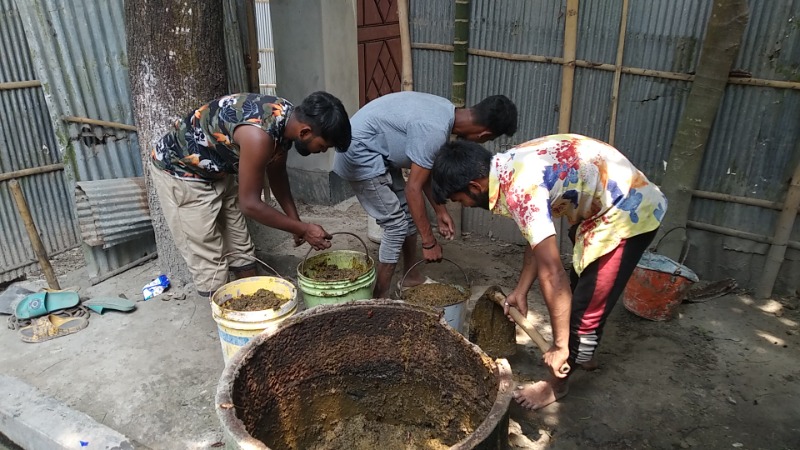 IMG_202304...4810.jpg
(Filesize: 138KB)
IMG_202304...4810.jpg
(Filesize: 138KB)
-
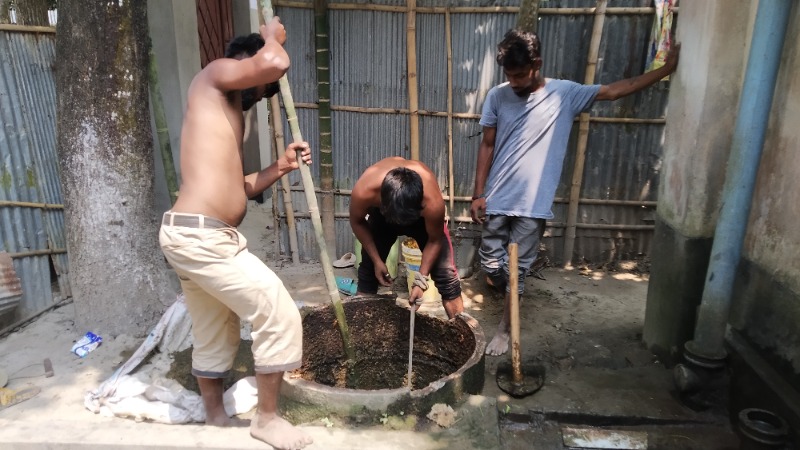 IMG_202304...1620.jpg
(Filesize: 128KB)
IMG_202304...1620.jpg
(Filesize: 128KB)
-
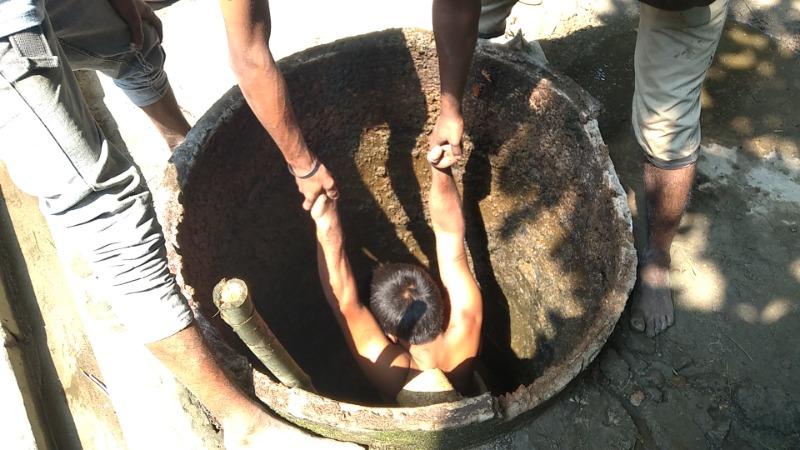 IMG_202304...5404.jpg
(Filesize: 120KB)
IMG_202304...5404.jpg
(Filesize: 120KB)
-
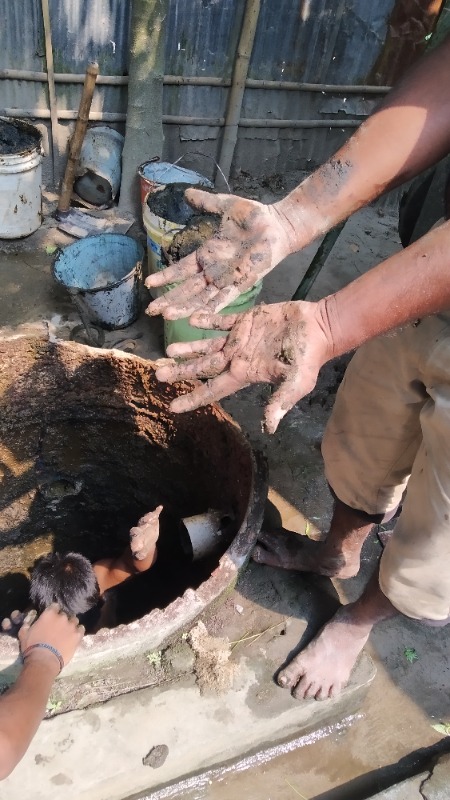 IMG_202304...0910.jpg
(Filesize: 136KB)
IMG_202304...0910.jpg
(Filesize: 136KB)
-
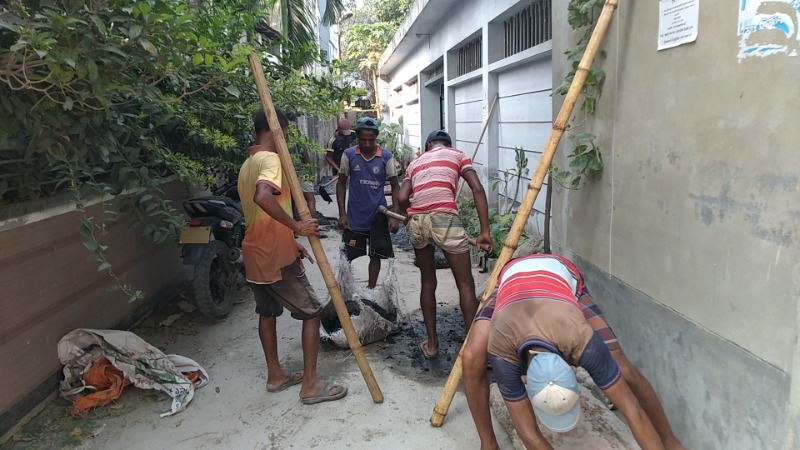 IMG_202304...0830.jpg
(Filesize: 121KB)
IMG_202304...0830.jpg
(Filesize: 121KB)
-
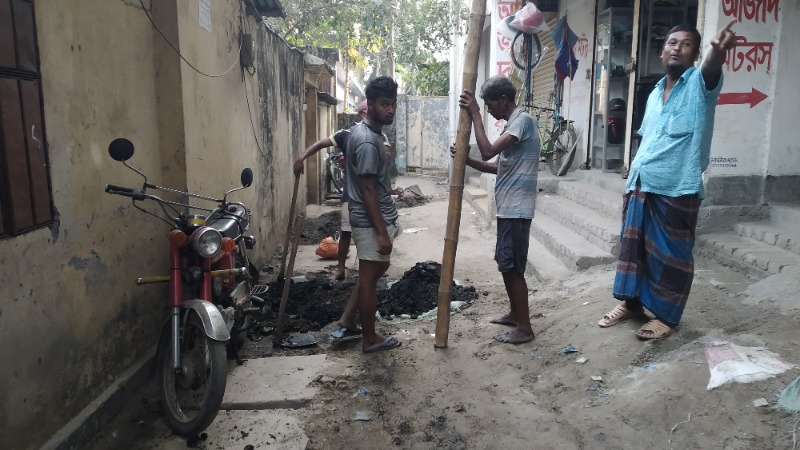 IMG_202304...4108.jpg
(Filesize: 134KB)
IMG_202304...4108.jpg
(Filesize: 134KB)
Please Log in to join the conversation.
You need to login to reply- shakilWASH
-
 Topic Author
Topic Author- CEO, PEACE(Research & Consultancy) WASH Focal , Tiller(Spatial Planning Consultancy) Specialist : #Climate Resilient Inclusive Smart City (CRISC) Planning and Development #Citywide Inclusive Sanitation Planning and Development
Less- Posts: 4
- Likes received: 2
Re: Sanitation Workers: A Frontier Fighter for Building a Healthy City [Case Study of Rajshahi City, Bangladesh
Sanitation workers have played crucial role for any city to keep environment sound and healthy, but their work
most often goes unnoticed and underappreciated. In Rajshahi city, located in north-western Bangladesh, sanitation workers face a range of challenges and difficulties in carrying out their important work in locally. Many sanitation workers in Rajshahi city are employed as muster role by the local government (Rajshahi City Corporation), but they often work long hours for low wages, with little job security or benefits. They are responsible for collecting and disposing of waste from homes, businesses, and public spaces, most often in hazardous and unsanitary conditions. One of the major challenges faced by sanitation workers in Rajshahi city are the lack of adequate equipment and protective gears. Many workers do not have access to gloves, masks, or other protective clothing, which puts them at risk of injury or illness from exposure to hazardous materials. Here, most of the sanitation workers both formal and informal haven’t use safety gears and don’t follow any occupational health and safety guidelines during their work due to their lack of awareness and access to safety gears (e. g. PPE).
“I never get any OHS training and PPE in my whole job life. But I have learned operating vacu tug from my driver and self-common sense. We work with empty hand and touched fecal sludge for the nature of my work. It’s so dirty work and most of people behaved with us as untouched attitude. My home far from working area and I hide my profession and work nature from my family members and neighbors. Our payment is so poor and its daily 440taka ($4) and monthly 13,200 taka ($ 130) only. How we can survive with our family and manage daily expenditure? There are no permanent job facilities, OHS gears and insurance. Actually, we are always unnoticed and our rights are always ignored by city authority and dwellers. We look forward to government and authorities for our basic rights and job securities.”
___Shamsul Islam (Experiences of 14 years in the vacuum tanker emptying profession, RCC)
During focus group discussion with most of the sanitation workers both manual and mechanical, they won't use PPE due to inaccessible, uncomfortableness and lack of awareness. I think foreign aids and INGOs should support OHS training and PPE to the sanitation worker frequently and develop capacity of Rajshahi City Corporation(RCC) authority. Moreover, PPE should be prepared considering local weather condition and promote them regular counseling. In addition, in Rajshahi city, sanitation workers often face discrimination and stigma from other members of the community. Their work is seen as dirty and unskilled, and they are often subjected to verbal abuse and harassment. So, its most important to raising awareness of city dwellers to ensure dignity and OHS of sanitation works.
"I am 63 years old and I have already passed 28 years in my sanitation job. I should to leave this risky job. Though, my financial and health condition is so poor. But in this condition, I have to continue work for my livelihood. Unfortunately, we don't have any health and life insurance and permanent job facility. We just used once and through like waste. If we accident during work, we won't get any health compensation and nobody take responsibility to support us. It's our generation-to-generation problem. We are suffering extreme poverty due to lack of works. We are unemployed day by day. What would be our future generations fate? We keep clean environment in the city, but what we get? Unfortunately, we get negligence, lowest payment, and no permanent job. Where occupational health and safety
supports are dream for us."
___Nitto Ranjan Hela (Experiences of 28 years in the manual emptying profession, RCC)
During focus group discussion with sanitation worker and KII with Conservancy officer, it's found that sanitation workers job not get any formal recognition by city authorities with considering permanent job facilities. They get payment like pay per work monthly basis and paid 440Taka ($4.4) for 7-8 hours. It's called "No work, no payment" during sick or absence due to injury. It's comparatively one third payment compare to formal sanitation worker (paid daily $12-$14 with others job facilities). In addition to, about 98% sanitation workers are informal called it Muster role and deprived from their basic labor’s rights and decent job facilities. Despite these challenges, many sanitation workers in Rajshahi city, feel pride in their work and are committed to keeping the city clean and healthy. They work tirelessly day in and day out, often in extreme weather conditions, to ensure that waste is collected and disposed of safely and efficiently. To address the challenges faced by sanitation workers in Rajshahi city, there is a need for greater investment in infrastructure and equipment, as well as increased awareness and respect for the important work that they do. By providing sanitation workers with the tools
and support that they need, we can ensure that they are able to carry out their work safely and effectively, and help to build a cleaner and healthier city for all. Along with this, the Rajshahi city authority should ensure decent job facilities and standard wages align with national wage standard grade.
most often goes unnoticed and underappreciated. In Rajshahi city, located in north-western Bangladesh, sanitation workers face a range of challenges and difficulties in carrying out their important work in locally. Many sanitation workers in Rajshahi city are employed as muster role by the local government (Rajshahi City Corporation), but they often work long hours for low wages, with little job security or benefits. They are responsible for collecting and disposing of waste from homes, businesses, and public spaces, most often in hazardous and unsanitary conditions. One of the major challenges faced by sanitation workers in Rajshahi city are the lack of adequate equipment and protective gears. Many workers do not have access to gloves, masks, or other protective clothing, which puts them at risk of injury or illness from exposure to hazardous materials. Here, most of the sanitation workers both formal and informal haven’t use safety gears and don’t follow any occupational health and safety guidelines during their work due to their lack of awareness and access to safety gears (e. g. PPE).
“I never get any OHS training and PPE in my whole job life. But I have learned operating vacu tug from my driver and self-common sense. We work with empty hand and touched fecal sludge for the nature of my work. It’s so dirty work and most of people behaved with us as untouched attitude. My home far from working area and I hide my profession and work nature from my family members and neighbors. Our payment is so poor and its daily 440taka ($4) and monthly 13,200 taka ($ 130) only. How we can survive with our family and manage daily expenditure? There are no permanent job facilities, OHS gears and insurance. Actually, we are always unnoticed and our rights are always ignored by city authority and dwellers. We look forward to government and authorities for our basic rights and job securities.”
___Shamsul Islam (Experiences of 14 years in the vacuum tanker emptying profession, RCC)
During focus group discussion with most of the sanitation workers both manual and mechanical, they won't use PPE due to inaccessible, uncomfortableness and lack of awareness. I think foreign aids and INGOs should support OHS training and PPE to the sanitation worker frequently and develop capacity of Rajshahi City Corporation(RCC) authority. Moreover, PPE should be prepared considering local weather condition and promote them regular counseling. In addition, in Rajshahi city, sanitation workers often face discrimination and stigma from other members of the community. Their work is seen as dirty and unskilled, and they are often subjected to verbal abuse and harassment. So, its most important to raising awareness of city dwellers to ensure dignity and OHS of sanitation works.
"I am 63 years old and I have already passed 28 years in my sanitation job. I should to leave this risky job. Though, my financial and health condition is so poor. But in this condition, I have to continue work for my livelihood. Unfortunately, we don't have any health and life insurance and permanent job facility. We just used once and through like waste. If we accident during work, we won't get any health compensation and nobody take responsibility to support us. It's our generation-to-generation problem. We are suffering extreme poverty due to lack of works. We are unemployed day by day. What would be our future generations fate? We keep clean environment in the city, but what we get? Unfortunately, we get negligence, lowest payment, and no permanent job. Where occupational health and safety
supports are dream for us."
___Nitto Ranjan Hela (Experiences of 28 years in the manual emptying profession, RCC)
During focus group discussion with sanitation worker and KII with Conservancy officer, it's found that sanitation workers job not get any formal recognition by city authorities with considering permanent job facilities. They get payment like pay per work monthly basis and paid 440Taka ($4.4) for 7-8 hours. It's called "No work, no payment" during sick or absence due to injury. It's comparatively one third payment compare to formal sanitation worker (paid daily $12-$14 with others job facilities). In addition to, about 98% sanitation workers are informal called it Muster role and deprived from their basic labor’s rights and decent job facilities. Despite these challenges, many sanitation workers in Rajshahi city, feel pride in their work and are committed to keeping the city clean and healthy. They work tirelessly day in and day out, often in extreme weather conditions, to ensure that waste is collected and disposed of safely and efficiently. To address the challenges faced by sanitation workers in Rajshahi city, there is a need for greater investment in infrastructure and equipment, as well as increased awareness and respect for the important work that they do. By providing sanitation workers with the tools
and support that they need, we can ensure that they are able to carry out their work safely and effectively, and help to build a cleaner and healthier city for all. Along with this, the Rajshahi city authority should ensure decent job facilities and standard wages align with national wage standard grade.
Best regards
Woakimul Islam Shakil
CEO, PEACE
Technical Focal, CWIS(DPHE, Bangladesh),Tiller.
Email: This email address is being protected from spambots. You need JavaScript enabled to view it.
This email address is being protected from spambots. You need JavaScript enabled to view it.
Cell: +8801744976369
Woakimul Islam Shakil
CEO, PEACE
Technical Focal, CWIS(DPHE, Bangladesh),Tiller.
Email: This email address is being protected from spambots. You need JavaScript enabled to view it.
This email address is being protected from spambots. You need JavaScript enabled to view it.
Cell: +8801744976369
Attachments:
-
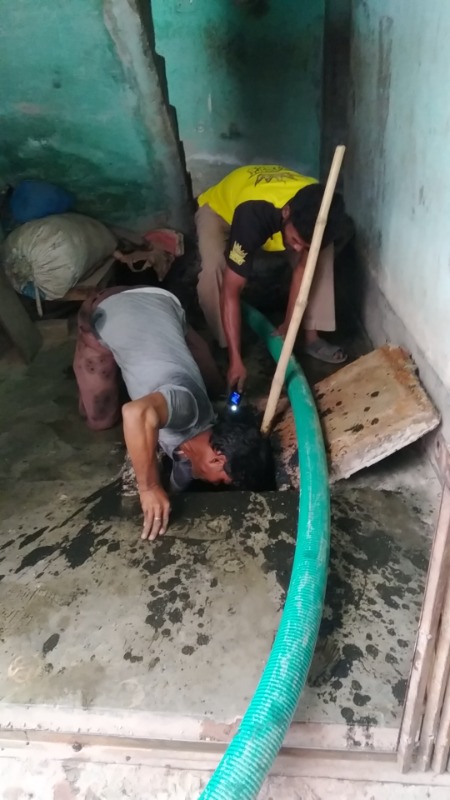 IMG_202303...5741.jpg
(Filesize: 88KB)
IMG_202303...5741.jpg
(Filesize: 88KB)
-
 IMG_202303...5314.jpg
(Filesize: 86KB)
IMG_202303...5314.jpg
(Filesize: 86KB)
-
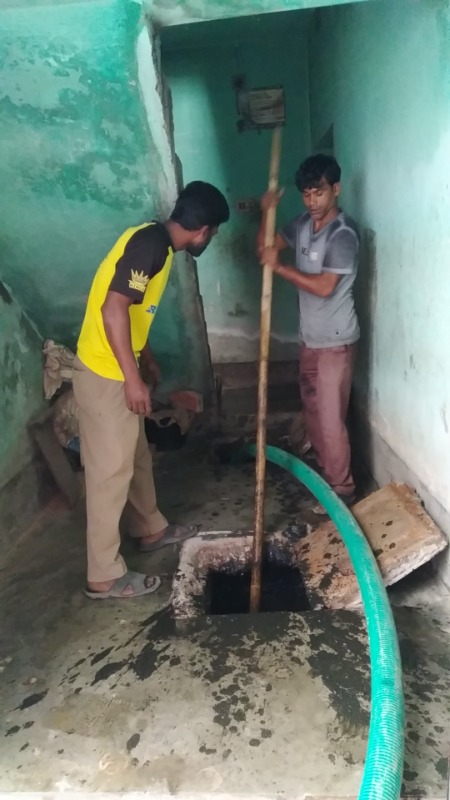 IMG_202303...5628.jpg
(Filesize: 84KB)
IMG_202303...5628.jpg
(Filesize: 84KB)
-
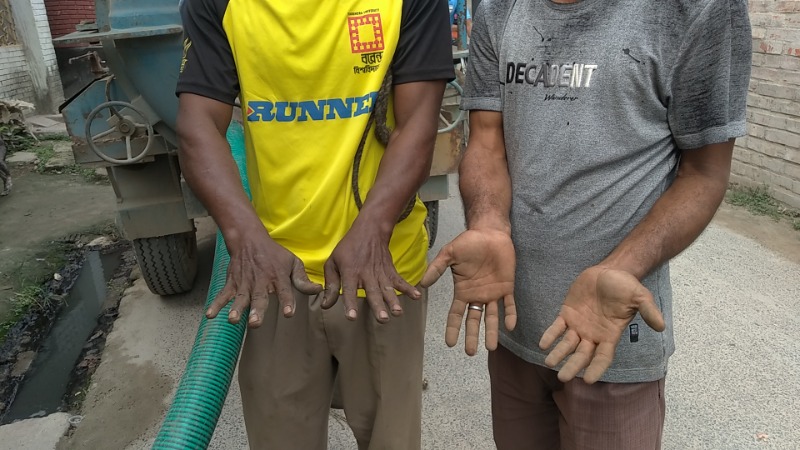 IMG_202303...4836.jpg
(Filesize: 120KB)
IMG_202303...4836.jpg
(Filesize: 120KB)
The following user(s) like this post: mahobul
Please Log in to join the conversation.
You need to login to reply- AjitSeshadri
-

- Marine Chief Engineer by profession (1971- present) and at present Faculty in Marine Engg. Deptt. Vels University, Chennai, India. Also proficient in giving Environmental solutions , Designation- Prof. Ajit Seshadri, Head- Environment, The Vigyan Vijay Foundation, NGO, New Delhi, INDIA , Consultant located at present at Chennai, India
Re: Sanitation Workers: A Frontier Fighter for Building a Healthy City[Case Study of Khulna City]
Dear SuSanA Member- Mr Shakil WASH.
We agree word for word what you have described,
In India too similar conditions prevail at the plight of san-wrkrs.
We need All to become aware of the importance of the nature of work and give dignity, status, equal remuneration and facilities that an H)T Electric Technicians get in their nature of work.
Wilt the use of PPE, Safety procedures, can have Gas- Meters to Monitor the gas % levels.
The state is highly dangerous to work without guard, Methane being odourless is difficult to detect and is highly lethal.
Our Well wishes to All in this trade.
Prof Ajit Seshadri
We agree word for word what you have described,
In India too similar conditions prevail at the plight of san-wrkrs.
We need All to become aware of the importance of the nature of work and give dignity, status, equal remuneration and facilities that an H)T Electric Technicians get in their nature of work.
Wilt the use of PPE, Safety procedures, can have Gas- Meters to Monitor the gas % levels.
The state is highly dangerous to work without guard, Methane being odourless is difficult to detect and is highly lethal.
Our Well wishes to All in this trade.
Prof Ajit Seshadri
Prof. Ajit Seshadri, Faculty in Marine Engg. Deptt. Vels University, and
Head-Environment , VigyanVijay Foundation, Consultant (Water shed Mngmnt, WWT, WASH, others)Located at present at Chennai, India
Head-Environment , VigyanVijay Foundation, Consultant (Water shed Mngmnt, WWT, WASH, others)Located at present at Chennai, India
The following user(s) like this post: cecile
Please Log in to join the conversation.
You need to login to reply- shakilWASH
-
 Topic Author
Topic Author- CEO, PEACE(Research & Consultancy) WASH Focal , Tiller(Spatial Planning Consultancy) Specialist : #Climate Resilient Inclusive Smart City (CRISC) Planning and Development #Citywide Inclusive Sanitation Planning and Development
Less- Posts: 4
- Likes received: 2
Sanitation Workers: A Frontier Fighter for Building a Healthy City[Case Study of Khulna City]
underappreciated. In Khulna city, located in southwestern Bangladesh,
sanitation workers face a range of challenges and difficulties in carrying out
their important work. Many sanitation workers in Khulna city are employed by
the local government, but they often work long hours for low wages, with little
job security or benefits. They are responsible for collecting and disposing of
waste from homes, businesses, and public spaces, often in hazardous and
unsanitary conditions. One of the biggest challenges faced by sanitation
workers in Khulna city is the lack of adequate equipment and protective gear.
Many workers do not have access to gloves, masks, or other protective clothing,
which puts them at risk of injury or illness from exposure to hazardous
materials.
"I got PPE and OHS training in 2018 and during covid 19. But I don't feel
comfortable to use PPE during work. It's made disturbance in work. So, I use
PPE rarely if get pressure from authority. Moreover, I think it's made me warmer
and over sweating in most of the time except winter. But I know, it's essential
to use PPE for my safety. I will use PPE if these are manufactured with
comfortable design and materials"
___Pranto Das (8 years Vacuum Tanker Emptying Profession, KCC)
During focus group discussion with most of the sanitation workers both manual
and mechanical, they won't use PPE due to uncomfortableness and lack of
awareness. I think PPE should be prepared considering weather in our area and
promote them regular counseling. In addition, sanitation workers in Khulna city
often face discrimination and stigma from other members of the community. Their
work is seen as dirty and unskilled, and they are often subjected to verbal
abuse and harassment.
"We don't have any health and life insurance facility and permanent job
facility. We just used once and through like waste. If we accident during work,
we won't get any health compensation and nobody take responsibility to support
us. It's our generation-to-generation problem. We are suffering extreme poverty
at present due to introducing Vacuum Tanker Emptying service. We are unemployed
day by day. What would be our future generations fate?
My younger son at age 14 among 3 children. He goes with me and help my work. I
won't able to send for primary education. Education is our dream. My average
monthly income is 4000 Taka ($50). Do you know how we can survive with current
price hike? We keep city clean, but what we get? We get poor payment, no
permanent job and job facility. "
___Gopal Das (25 years manual emptying profession, KCC)
During focus group discussion with sanitation worker and KII with Conservancy
officer, it's found that sanitation workers job not get any formal recognition
by permanent job and facilities. They get payment like pay per work daily basis
and paid 450-550Taka ($5-$7) for 6-8 hours. It's called "No work, no
payment" during sick or absence due to injury. It's comparatively half
payment compare to formal sanitation worker (paid daily $10-$12 with others job
facilities). In addition to about 97% sanitation workers are informal and
deprived from their labor’s rights and decent job facilities. Despite
these challenges, many sanitation workers in Khulna city take pride in their
work and are committed to keeping the city clean and healthy. They work
tirelessly day in and day out, often in extreme weather conditions, to ensure
that waste is collected and disposed of safely and efficiently. To address the
challenges faced by sanitation workers in Khulna city, there is a need for
greater investment in infrastructure and equipment, as well as increased
awareness and respect for the important work that they do. By providing
sanitation workers with the tools and support that they need, we can ensure that
they are able to carry out their work safely and effectively, and help to build
a cleaner and healthier city for all.
Best regards
Woakimul Islam Shakil
CEO, PEACE
Technical Focal, CWIS(DPHE, Bangladesh),Tiller.
Email: This email address is being protected from spambots. You need JavaScript enabled to view it.
This email address is being protected from spambots. You need JavaScript enabled to view it.
Cell: +8801744976369
Woakimul Islam Shakil
CEO, PEACE
Technical Focal, CWIS(DPHE, Bangladesh),Tiller.
Email: This email address is being protected from spambots. You need JavaScript enabled to view it.
This email address is being protected from spambots. You need JavaScript enabled to view it.
Cell: +8801744976369
The following user(s) like this post: AjitSeshadri
Please Log in to join the conversation.
You need to login to reply
Share this thread:
- Equity, inclusion and sanitation workers
- Sanitation workers
- Health and safety aspects for sanitation workers
- Sanitation Work: Casestudies from Bangladesh
Time to create page: 0.101 seconds







